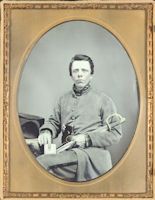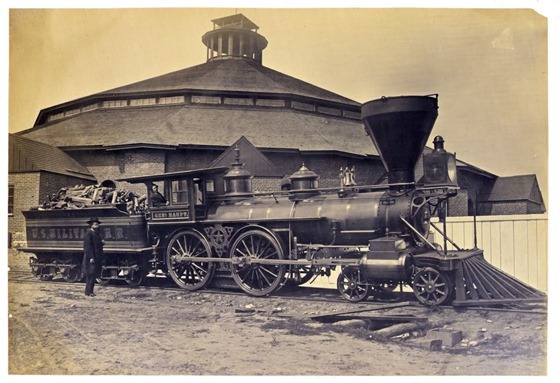Headquarters 1st Army Corps, May 30, 1863.
Dear Father, — I received your letter yesterday in regard to George, and will try and show it to Colonel Hayes. I am sorry that the Governor has sent George’s name back, as Colonel Hayes took George almost solely on my recommendation, as I had lost those you sent me, and now I am afraid that he will think that the Governor is opposed to George. I shall see him as soon as I can get away from camp. The regiment (18th) had no chance to distinguish itself at Chancellorsville, and only lost one man killed and half a dozen wounded, so that there was no chance for any man to deserve promotion for bravery.
I am very pleasantly situated now with General Reynolds. The way I came to leave General Benham was as follows: you know that I tried to get off his staff as soon as that trouble occurred that night. For some time he did not know that I was trying to leave him, and he did not dare send me away, for fear that I would tell people that I was sent away for saying that he was drunk. He told an officer, whom I know quite well, and whom he did not know I was acquainted with, that he should not touch Weld this time, but that he would give it to him in a little while. The old rascal meant to let this affair pass by, and then try and catch me on something and play the mischief with me. By some means or other, he got wind of my efforts to get a position on another staff, — I think myself that he listened to some conversation going on in my tent, — and so he thought he would get ahead of me, and send me back to my regiment, and at the same time prevent my getting on General Sedgwick’s staff, so that by having the odium of being sent back to my regiment on me, I could not get another staff position, and could do him no harm in my regiment, where whatever I might say would be confined to a limited circulation. I can tell you he is the most cunning and bitter man I know of. I found out everything that he was planning, and so went to him immediately and told him that thinking my presence would not be agreeable to him, after what occurred between us in regard to that night, I had been trying to obtain a position on another staff, and that I hoped to hear the next day in regard to it; that if I was not successful, I should like to return to my regiment. He said that he supposed I had been trying to leave him, and that he had selected another aide to fill my place. I then said that I would like my resignation to take effect two days from that time. He asked me where I was trying to go. I said that I would rather not tell him. He then spoke about what I had done, and said that I had committed a gross violation of good faith, etc. I told him that I had acted solely from what I considered my duty, and that I felt that I had done perfectly right. I then went over to headquarters of the Army of the Potomac, where I met General Reynolds and told him that I had resigned my place as A. D. C. to General Benham and would like to go with him as acting aide if he was willing to have me. He said that he should like to have me very much indeed. That when he heard that I had gone with Benham he felt very sorry, for he felt sure that I could not get along with him. I told him the whole story, and what I had done. He said that I had done perfectly right; that he saw him that night, and knew that he was drunk, and that General Wadsworth also knew that he was drunk. I felt very much relieved indeed. The day I left him, and while on my way to General Reynolds’s, I stopped at General Sedgwick’s and said that I wished to have a few minutes’ conversation with him about that night. He said that I had done right. He asked me as I came in, whether old Benham had shipped me, or I old Benham. General Reynolds has been very kind to me, indeed, throughout the whole of this affair.
We have had orders to move for two or three days, but I suppose we shall stay here for a while. I think that the enemy have been threatening our right flank, and that we were to move up there, but as a division of the Fifth Corps has already gone there, I think there will be no necessity for our moving for some time. I think the enemy will assume the offensive before we do, and I am afraid now that they will try and cut us off from Washington.
All General Benham’s staff have left him except Captain Clapp, his A. A. G., and Captain Strang, his Q. M. They will leave as soon as possible. I hear that he is very bitter on his staff, indeed.
The weather here has been extremely dry and hot for some time. It is entirely different from our weather up North, or rather its effects are different. Here I can sit all day with coat off and do anything of that kind, which up North would give me a severe cold. I suppose living in the open air all the time has a great deal to do with it. . . .
We had a review of the corps this morning at 7 o’clock. There were only some 8000 men out. The 13th Massachusetts made a very fine appearance. Indeed our Massachusetts troops are ahead of any others that I see, except some of the Western troops, who make fine soldiers. Jarves’s old regiment, the 2d Wisconsin, is in this corps, and a fine regiment it is. . . .









 Note – This image has been digitally adjusted for one or more of the following:
Note – This image has been digitally adjusted for one or more of the following:
